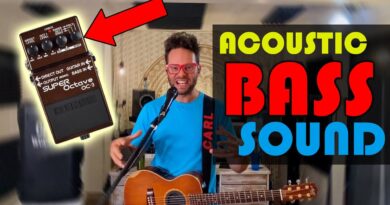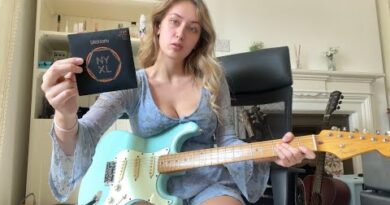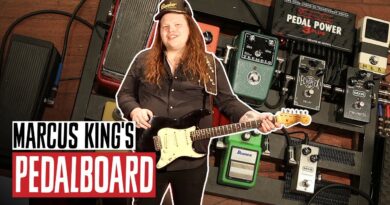How capacitors can shape your tone
In this video, let’s discuss about how capacitors can shape your tone.
Music starts @ 0:44
EMERSON PAPER IN OIL TONE CAPACITORS
https://emersoncustom.com/products/emerson-paper-in-oil-tone-capacitors?variant=42819295434
How To select the right capacitor for your guitar! 3 tips – Dylan Talks Tone
Line 6 Helix Native
https://line6.com/helix/helixnative.html
Harley Benton Fusion Pro Roasted Maple HSH
https://www.thomann.de/intl/sg/harley_benton_fusion_hsh_roasted_maple.htm?ref=search_prv_6
Harley Benton TE-70 Black Paisley
https://www.thomann.de/intl/sg/harley_benton_te_70_black_paisley.htm
Seymour Duncan Hot Tele Set
https://www.seymourduncan.com/pickup/hot-tele-set?__uuid_ref=5bc2653775246?__uuid_ref=5bc265377528f
Recorded with the
UAD Apollo Twin Duo
thru
Line 6 Helix Native
on
Digital Performer 9.5
Backing Track
https://jtcguitar.com/store/package/just-jam-relaxed-grooves/
#capacitors #shape #tone
Originally posted by UCGRld0AJM88o9hZuv-3rgWw at https://www.youtube.com/watch?v=vtT3tVApGCI




are they emerson and bumblebee are same with deferent skin capacitor?
I usually leave my tone at around 7 on my LP and Tele and crank it up for prominent single picking, sometimes rolling down to smooth over the cleans. What I'm learning is that a lot of the older players I like were constantly adjusting tone and volume but with the older wiring/caps/pots. They got more range and subtlety from these older parts.
I ordered a Russian NOS PIO I found that was about 3rd cost of the usual ones and a mojotone current production. I am going to install these with CTS pots on one of my LP's and see what it does first hand.
I subscribed because your user name is awesome! Haha! And love your playing too! 🙂
Capacitor is capacitor, the type makes no difference in guitars. It's the capacity that is making your tone change.
Why? The signal running through the capacitors in a guitar is dumped, it's the exact part that you don't hear. If you're hearing a difference in tone from oil to ceramic, it's because they have a different capacity. Don't overpay for capacitors, it's nonsense.
This might not be true in amplifyers, as there the voltage picks up, and very magical things happen that I can't explain yet ???? unicorns and butterflies ????
I used a tone capacitor in my hollowbody guitar to brighten the sound of the muddy neck pickup. I just soldered a 0.047 cap in series with the hot pickup lead, very simple and effective.
Sunday morning and I stumbled on this video…heard your music…from a musicians view….outstanding!
your tone is amazing
Hi, the caps alter the tone in position 0 is afected by the cap, also the volume pot o anithing that sum resistance to the load of the circuit. When you change the value of the tone cap, the low pass filter change to and the center peak frequency, when you bypass tone circuit a la "Van Halen" the pickups sound with all the frecuency free, and if you change the volume pot for one whit more value, more HIghs lets trough. The value of the capacitor not only changes the amount of treble that goes to ground in use, but also a low pass filter is always applied, this filter is more or less aggressive depending on the value. In short, depending on the sound of the pickups, you can choose the tone capacitor that makes it sound better while the tone is at 0.
I just wanted to say that the Telecaster sounded perfect.
Your melody is so sweet.
Don’t the capacitors in external effects pedals change the ultimate tone..??
There is a factor that almost all people do not take into account the tolerance of capacitors, which can vary (+/-) 5%, 10% or even 20%! This means that a value of 22nF (0.022uF) written on the capacitor body is not really the exact value! The test should be done with selected capacitors in a capacitance meter (measuring instrument), all with the same value or very close together. The test capacitors with the same values will produce a hearing difference?
As I said, one can be at 0.025uF, one at 0.027uF and the other at 0.018uF, … But all being 0.022uF!
The older ones, 50 years old, can vary a lot more (50%) like this oil colored one, so it could be throwing $$ in the trash!
Fantastic! ????
About 6 years ago I picked up a like new, one owner, 2005 Gibson Les Paul Studio Faded T. At first I was thinking that it probably had a printed circuit board and that I'd have to yank it out and put in the real deal. I was wrong. The T in Faded T really is for Traditional. I opened it up to see old school wiring and with Burstbucker Pro pickups. As for my Les Paul, I've kept it the way it is. This guitar is the first guitar I've owned that I didn't have to make any modifications to. However, if I did, it would be the caps. Great video, glad I found your channel.
Hey if you dont mind me asking Im so amazed the way you record your performance, if you dont mind me asking what Mic are you using to record youre Performance
18$ for a capacitor. oof that is extreme, I cannot stomach that
i have more than a year using emerson 0.047 on my telecaster, the tone that guitar drive me to play some smooth tone (jazzy kind a like). and to day i try to put the cheap capacitor (mkm capacitor/mylar type i think). and tone my guitar drive me to play more vintage tone like the real blues and country music type. i am using pure vintage 64 pickup from fender. i believe need more time to feel the capacitor change your tone. IMHO
I want to say thanks for the information. Just FYI you should always check new capacitors no matter what brand to make sure they are close to tolerance. If the tolerance if off it may be a bit out of range. So although some brands may be hype, there are tolerance gaps to consider on low cost pots.
Sometimes it only takes a few seconds to tell that it will sound fine. Very nice playing !
I subscribed 😉
Tone pot in '0' position forms a low pass filter with serial resistance equal to the pots max resistance. This is why 'tone at 10' still affects your signal slightly. (dB drop, tiny high-end loss depending on cap+res values and pickup specs) You will easily see the difference when using no-load tone pots. This way you can take the LP filter out of the circuit when the pot is at 100% and compare.
Beautiful brother nice sweet tone on your lead and choice of song.
Good lord. Nice and smooth playing!
To me, capacitors are basically fine tuning the tone. I think trying a range of values of one type (paper in oil, ceramic, etc.) to see what you like best from each of those types.Then compare your favorite from each is the best way to determine what sounds best in your particular guitar. If course this costs you extra unless you have access to the capacitors for free before selecting.
1:20 in that tele sounds incredible
great playing . great ????????????
I truly admire your passion while playing ????
Great playing. .. sounds very Dr Hook . Sharing the night together. Inspired
Nicest music I heard today here.